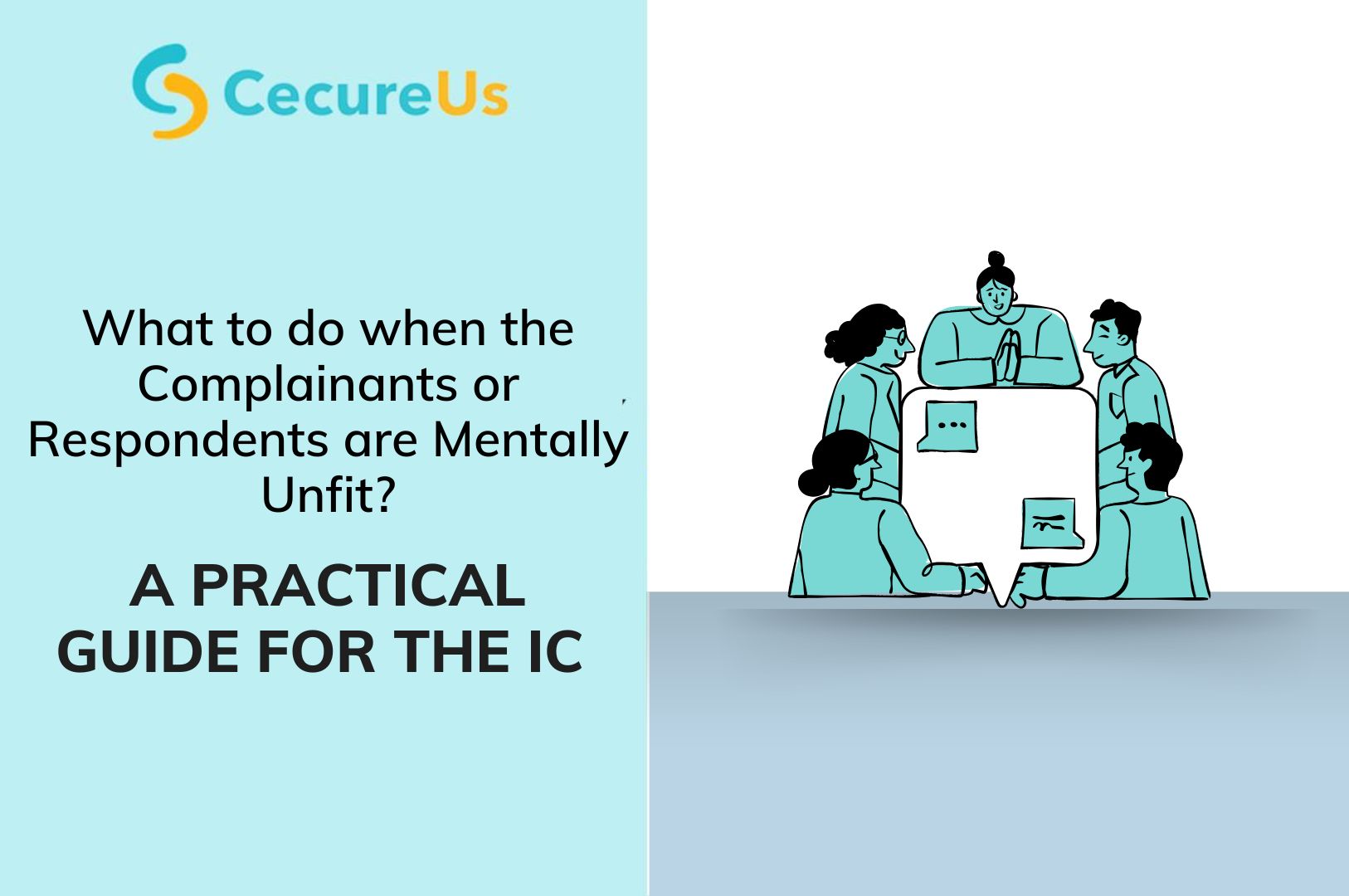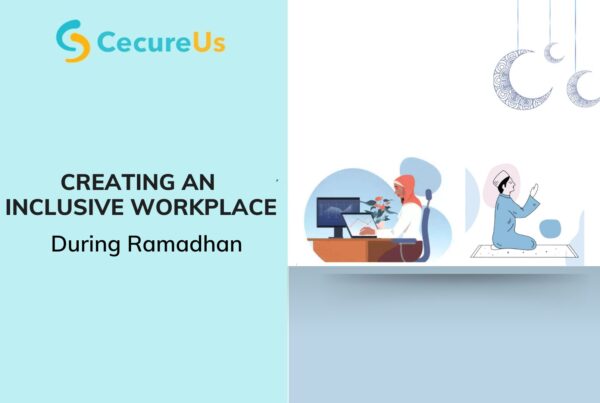
The redressal mechanism prescribed under the current POSH law aims to ensure an environment that is not only safe but also equitable for all. In some instances the Internal Committee (IC) may come across Complainants or Respondents that are mentally unfit and this may affect the inquiry proceedings. Nonetheless, the IC must strive to balance legal compliance with principles of Natural Justice. The IC in such scenarios must be sensitive, compassionate and considerate while also being fair, trauma-informed and respectful of the rights of the vulnerable individuals.
What is “Mental Unfitness”?
Mental unfitness can manifest itself in various forms, both as temporary symptoms and as chronic issues. The temporary manifestations can range from psychological and emotional, to even behavioural symptoms. These include:
- Shock
- Trauma after an incident
- Mood swings
- Irritability
- Anxiety and panic attacks
- Isolation
- Substance abuse
- Depressive episodes
The chronic symptoms may manifest as psychiatric illness or intellectual disability. Common situations include:
- Severe depression or anxiety
- Post-traumatic stress disorder (PTSD)
- Schizophrenia, bipolar disorder, or other psychiatric illnesses
- Cognitive impairments or developmental disabilities
- Chronic Health Issues
It is important to note that if a Complainant or Respondent is mentally unfit, they must not be shunned from the proceedings or their statement disregarded. In such sensitive scenarios, the IC must embody compassion and fairness in equal measure without prejudice. The inquiry process adopted by the IC must be adapted to suit the circumstance.
What does the law say?
The POSH law does not directly refer to circumstances where the parties may be mentally unfit. However, the spirit of the law requires redressal mechanism to be grounded in:
- Principles of natural justice viz., audi alteram partem (the right of both parties to be heard) and Nemo judex in causa sua (No one should be a judge in their own case which would also include precluding any member of IC with a conflict of interest)
- Sensitivity toward vulnerable individuals by accommodating their circumstances which includes allowing for guardians and third parties to file the complaint, mandating the IC to provide reasonable assistance in filing the complaint and allowing for an extended period of 3 months to file the complaint at the IC’s discretion basis the circumstance and providing for action during pendency of inquiry to accommodate the mental state of the parties.
- Inclusion of NGOs, guardians and/third parties to support victim-sensitive procedures.
Where the IC has concluded that the Complainant or the Respondent is mentally unfit, the IC can refer to provisions in the following laws:
- Mental Healthcare Act, 2017
- Rights of Persons with Disabilities Act, 2016
Handling cases of mentally unfit parties 101:
- Identify and acknowledge signs of Mental Unfitness
The IC must be sensitive, aware and vigilant in looking for any signs of mental illness. Some signs include:
- Making incoherent or delusional statements during inquiry proceedings
- Memory loss and inability to recall basic facts
- Unexpected and/or repeated emotional outbursts during the proceedings
- Aggressive or self-destructive behaviours
- Paranoia or hypervigilance
- Request Medical Assistance and documentation
In cases where either or both parties display signs of mental unfitness, it is highly recommended that the IC take the following steps before making a decision.
- Seek psychiatric assessment by a trained professional
- Seek a medical certificate from a trained professional
- Ensure that informed consent is obtained from the individual(s) before proceeding with the above.
- Seeks advice on the party’s capacity to testify
- Ask for help in decoding behavioral responses
- Take guidance on trauma-informed questioning without triggering the individual
It is important to remember to seek professional medical opinion before making a decision on the mental unfitness of an individual to ensure fair and correct actions are taken. This also helps in ensuring that the parties are able to effectively understand and communicate during the proceedings.
- Accommodate assistance requests
If the IC has concluded that a party is mentally unfit, but the proceedings must also proceed, the IC must ensure all steps are taken to accommodate the mentally unfit individual. This may include the following:
- Allowing a legal guardian, caregiver, or support person (as defined under the Mental Healthcare Act) to accompany them during the inquiry proceedings.
- Allowing the party to make written submissions if oral submissions cause distress or are difficult.
While another person may be allowed to support the mentally unfit party, the IC must ensure that this inclusion is formally recorded in the proceedings. The IC must also ensure that this support person does not influence the statements or proceedings in any manner.
- Adapt and modify the inquiry proceedings
Where either party is mentally unfit, the IC must refrain from conducting inquiry proceedings as if the individual were fully capable. The IC must take appropriate measures to accommodate their condition with sensitivity, due care and awareness. A few ways that the IC can adapt to such circumstances are detailed below.
- By using simple language during the proceedings
- Conducting the inquiry in shorter segments
- Permitting submissions of written statements instead of oral submissions
- Accepting oral statements in certain cases or statements made through guardians
- Treating the individual with sensitivity and providing emotional support during testimony especially during emotional outbursts
- Selecting neutral, calming and non-intimidating environments for conducting sessions
- Building a trauma-informed inquiry process
- Taking extra care to validate facts through corroboration
- Avoiding drawing conclusions or taking prejudiced stances
By taking these approaches and making such adaptations will ensure that the inquiry conducted by the IC is effective and ensures that the parties can meaningfully participate in the proceedings.
- Maintain dignity and confidentiality
- Refrain from disclosing mental health details to unrelated parties
- Refrain from making ignorant, prejudiced statements, stigma or unwarranted labels during the inquiry and in the report
- Ensure professional boundaries are maninated throughout the process
- Show empathy and compassion to the individual(s).
- Do not get carried away by sympathy and ensure fairness in the proceedings.
- Move forward thoughtfully and with caution
If the mentally unfit individual is so unwell that they are unable to effectively participate in the proceedings and the same may be detrimental to their stance, the IC may take the following steps to accommodate the circumstances:
- Suspend the inquiry temporarily and document the same
- Notify upper management and seek their support in handling the scenario
- Seek legal advice without breaching confidentiality
- Resume once the individual is medically fit
- Defer the inquiry indefinitely
It is important to note that if the circumstances become so dire, the IC must proceed with caution. All actions taken by the IC in such instances should be documented with detailed reasoning and evidence where possible.
Documentation Checklist
The IC must be careful that it should keep a record of all details of the proceedings. Especially in cases where either or both parties are mentally unfit, the IC must keep records of:
- Medical opinions or fitness certificates
- Inclusion and participation of support persons
- Adjustments made in procedure
- All correspondence and meeting notes
- All actions taken to accommodate the individual(s) with detailed reasoning
It is important to note that keeping detailed and thorough documentation ensures that the inquiry proceedings stand up to legal scrutiny and is also recommended keeping in mind the need for transparency.
Conclusion:
Any handling of POSH cases/inquiry proceedings that involve mentally unfit persons involves empathy, compassion, adaptability, awareness, fairness and a firm understanding of the law. While handling such cases the IC walks on ice. It must not only respect the mental health needs of the individual but also ensure a fair, equitable and impartial proceeding.
By following the recommendations hereinabove, which include trauma-informed processes, involving trained mental health professionals, ensuring confidentiality, maintaining dignity, the IC can skilfully manage such sensitive situations involving vulnerable individuals with care and within the process prescribed under law.
Please reach out to us for any queries on What to do when the Complainants or Respondents are Mentally Unfit.
For more blogs and articles, visit our official website. Contact us for workshops and queries related to POSH, EAP (Employee Assistance Program) , Diversity and Inclusion and Code Of Conduct.




